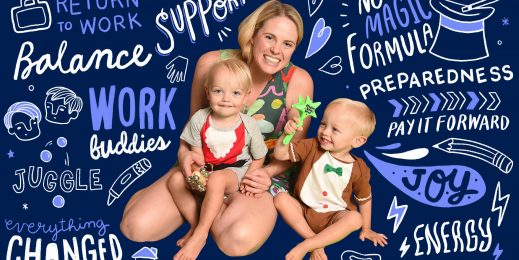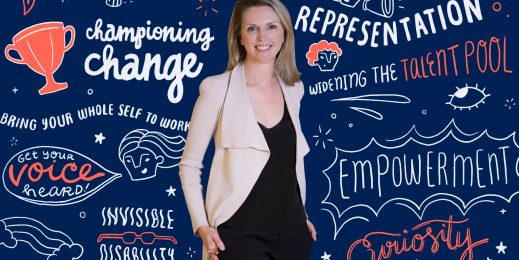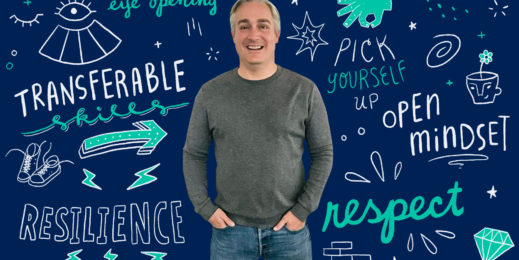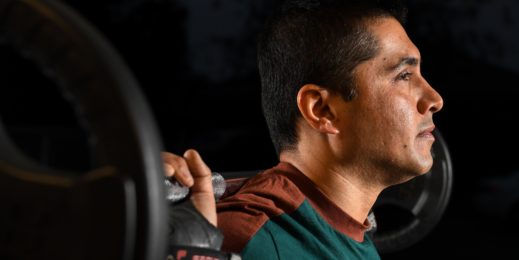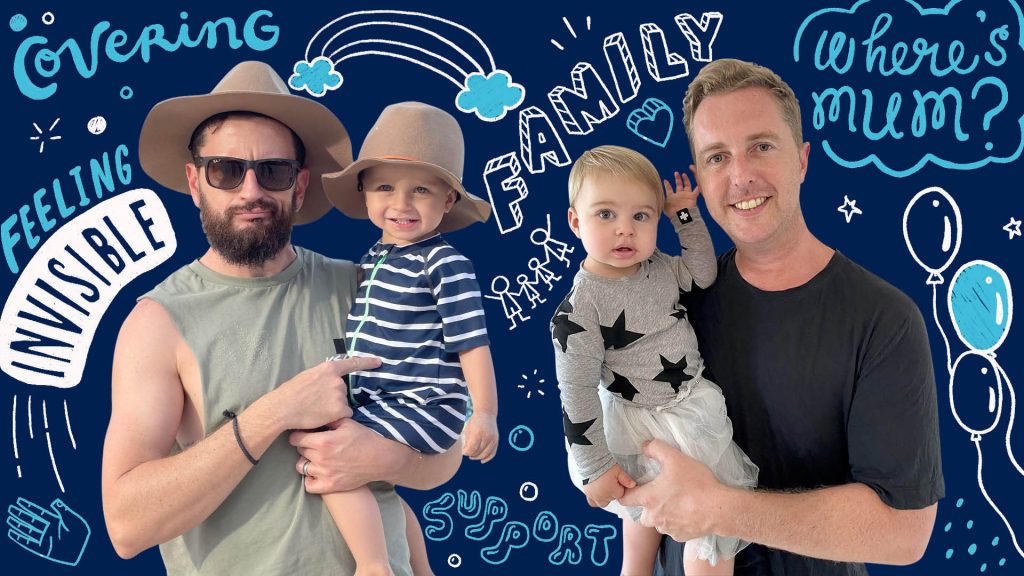
“We’re not same-sex parents, we’re just parents”: Two new dads on allyship at work and in the playground
It’s the week leading up to Sydney’s Gay and Lesbian Mardi Gras, and Mitch Shelley doesn’t quite recognise himself. Normally about this time of year, the Channel Marketing Manager for Xbox at Microsoft Australia is preparing for one of the biggest event in the community’s calendar.
But two years ago, Mitch and his partner welcomed a baby boy called Riley to the world – and being Riley’s dad now takes up a fair bit of his time. “The pace has kind of changed these days,” he laughs.
Like Nathan Wilson, another new dad from Microsoft’s LGBTQI+ community, Mitch travelled a long road to parenthood. For both men, this road was paved with overseas travel, sleepless nights and copious amounts of joy.
But the most interesting part has been the world’s reactions to their journeys.
Are you pregnant yet?
When they decided to start their families, neither Nathan nor Mitch ever considered keeping the news from their colleagues.
Nathan, who is Category Lead on Microsoft’s consumer team, didn’t always feel comfortable bringing his whole self to work. Once, in an effort to fit in with a former employer’s company culture, he felt the easiest option was to make up a fictional girlfriend.
“But I’ve always felt I could be my authentic self at Microsoft,” he says. “And this wasn’t any different. My teammates were so invested in the journey. It was like, ‘Are you pregnant yet? Are you pregnant yet?’”
These teammates were among the first people Nathan told when, in 2019, he and his partner learned they were expecting. “It was such a proud moment to be able to share the news with the people who had been in my corner, backing me the whole time.”
Like Nathan, Mitch knew that he’d have the full support of his colleagues. While he hadn’t felt the need to cover in previous roles, he had faced other challenges. “Maybe it’s coming from a blue-collar background,” he says. “But I have a sort of camouflage where people often assume I’m straight, so coming out can be a constant process.
Microsoft is the first workplace where I’ve felt I could just be who I am.
In fact, it was Microsoft’s support for rainbow families that got Mitch thinking about starting a family sooner rather than later.
At a work Christmas party a couple of years ago, he was sharing his life plans with a colleague when the topic of kids came up. Mitch had always assumed he’d have to save up not just for surrogacy and IVF, but also for a period of unpaid leave. But when this colleague told him that Microsoft’s 18-week paid parental leave policy applied regardless of sex, gender identity and sexual orientation, the wheels began to turn.
“It was a lightbulb moment,” he says. “I realised, wow, this is actually realistic. And that pushed it up the agenda for me.”
“The acceptance doesn’t always feel authentic”
At work, Nathan felt completely supported in his decision to become a father. But when he took four months off after his daughter Haris’s birth, he noticed something odd. As he took Haris to the park, or walked her down the street in the pram, passers-by would often stop and say, “Good on you, giving Mum a break,” or “Where’s Mum today?”
“There are still a lot of assumptions about the roles that male parents should play,” he explains. “Even in the signs that show where to park your pram, you’ll never see a father. We often say that it’s acceptable for men to take that role, but the acceptance doesn’t always feel authentic.”
Mitch, who took 10 months’ leave, agrees we have a long way to go when it comes to gendered expectations around parenting. “I’ve never felt more invisible in my life than I have in baby stores,” he recalls. “If sales assistants noticed me at all, they assumed I was someone’s bored husband. On the bright side, no-one was annoying me while I was trying to shop. But it is a bit of a struggle when you do want help.
“People often assume you don’t know what you’re doing. But if you’re the primary carer, your brain is wired to that child.
Male or female, you are going to wake up when they cry and understand what they need. And I think people are only just starting to get their heads around that.
“At the end of the day, we’re just parents”
These experiences illustrate how prejudice affects everyone – the fathers who embrace the stay-at-home role just as much as the mothers who reject it. But in the years to come, when Mitch and Nathan reflect on their early experiences of parenthood, these aren’t the only stories they’ll remember.
Mostly, they’ll remember the allyship they found among friends and colleagues who shared in their joy and – the best thing you can do for any new parent – made them feel less alone.
“When we began our journey, I had so many colleagues come forward and share their own stories about the processes they’d gone through to become parents,” says Mitch. “Maybe I was a bit naïve, but I didn’t realise how common IVF was. And to have those stories told to me with such frankness and openness, it brought me closer to a lot of my colleagues.”
“It made me realise that it’s not just hard for two guys,” agrees Nathan. “It can be hard for any couple looking to start a new family.
Because, at the end of the day, we’re not ‘same-sex parents’ – we’re just parents. And hopefully, by normalising rainbow families and smashing stereotypes, we can help clear a path for people who want to do this in the future too.
A different sort of Mardi Gras
So, what will Mitch’s and Nathan’s families be getting up to this Saturday night, as the Sydney Cricket Ground throngs with LGBTQI+ people and their allies?
“Right now, I’m embracing the dad bod,” Mitch laughs. Instead, he and his partner will probably join their friends for a low-key celebration at the pub, with Riley in tow.
Nathan, whose daughter has just turned one, is planning an even quieter one. “I’ll probably be sleeping on the sofa by seven o’clock,” he says. But that doesn’t mean he’ll let the occasion go unobserved. “For me, Mardi Gras is always a time to reflect on the 1978ers who started the movement and allowed us to be where we are today – and to think about how much further we can still go from here.”






